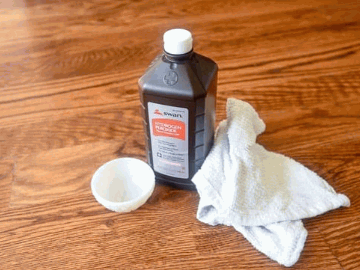Slippery floors can be a hazard in any home, leading to potential accidents and injuries.
We explore the common causes of slippery floors and provide practical tips on how to prevent them.
Learn about using non-slip mats, applying natural cleaning agents like vinegar and lemon juice, and discovering easy home remedies and natural solutions for keeping your floors safe and slip-free.
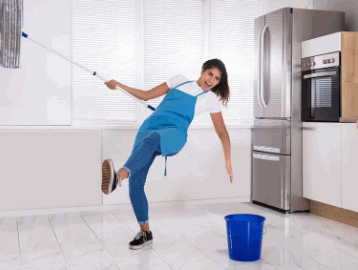
What Causes Slippery Floors?
Slippery floors can be caused by various factors such as spills, residue buildup, polished floors, or even the wrong type of footwear. These hazards pose a significant risk, especially in households, leading to slip and fall accidents.
When a homeowner neglects to clean up a spill promptly, it can seep into the floor, creating a slick surface. Similarly, residue from cleaning products can leave a slimy film, increasing the likelihood of accidents. In certain cases, excessively polished floors can become dangerously slippery, especially when combined with the wrong type of footwear, such as high heels or worn-out sneakers. These scenarios heighten the safety hazards, making it essential for individuals to take preventive measures to reduce the risks associated with slippery floors.
How To Prevent Slippery Floors?
Preventing slippery floors involves using effective solutions such as non-slip mats, regular cleaning routines, and applying anti-slip treatments to ensure safety and prevent accidents.
Non-slip mats are essential in high-risk areas to provide traction and reduce the chances of slipping. Incorporating a systematic cleaning schedule using appropriate cleaning agents and techniques helps keep the surface clean and less prone to becoming slippery over time. Frequent inspections and timely repairs to any damaged flooring can contribute significantly to the overall safety in preventing accidents related to slippery floors. By implementing these preventive measures, businesses and homeowners can create a safer environment for everyone.
Use Non-Slip Mats
Non-slip mats are essential household items that provide traction and grip on slippery surfaces, reducing the risk of falls and enhancing safety within the home environment.
These mats come in various shapes, sizes, and materials, catering to different needs and preferences. Choosing the right non-slip mat for specific areas in your home, such as the bathroom, kitchen, or outdoor spaces, can significantly boost safety levels. Non-slip mats are easy to clean, making maintenance a breeze.
- Regular cleaning with mild soap and water can help prolong the lifespan of these mats
- Inspecting them periodically for any wear and tear is important to ensure their effectiveness in preventing accidents.
Investing in high-quality non-slip mats not only enhances safety but also adds a touch of style to your living spaces.
Learn more: How To Make Vacuum Lines In Carpet
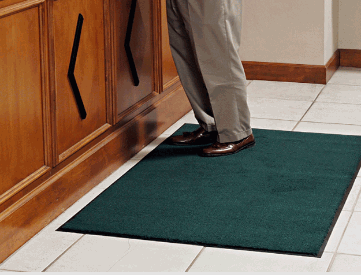
Apply Non-Slip Coatings
Applying non-slip coatings such as anti-slip treatments or non-slip floor wax on various flooring materials can significantly reduce the slipperiness of surfaces, making them safer for foot traffic.
These coatings create an invisible barrier that enhances the traction of floors, preventing slips and falls. The application process is typically straightforward, involving thorough cleaning of the surface, followed by the application of the chosen coating using specific tools. Once applied, these coatings require regular maintenance, including periodic cleaning and reapplication to ensure continued effectiveness.
These treatments do not alter the appearance of the flooring material, maintaining its aesthetic appeal while providing an essential safety feature. By improving the slip resistance of surfaces, these coatings offer peace of mind to residents, employees, or visitors who traverse the area.
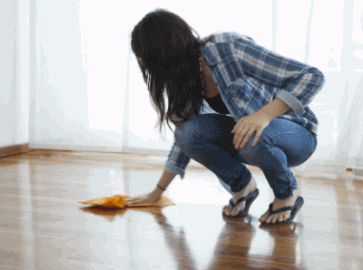
Keep Floors Clean And Dry
Maintaining clean and dry floors is crucial in preventing slipperiness caused by residue buildup or soap residues. Using effective cleaning products like vinegar solution helps eliminate grease and dirt, enhancing floor safety.
Regularly cleaning floors with vinegar solution not only aids in removing residue but also acts as a natural disinfectant, killing germs and bacteria that can contribute to slippery surfaces.
When cleaning, make sure to dilute the vinegar properly to avoid any damage to the flooring material. For stubborn residue, a mixture of vinegar and warm water can be left to soak for a few minutes before scrubbing.
Remember to thoroughly rinse the floor to ensure no slippery residue is left behind, and consider applying a sealant to maintain a slip-resistant surface over time.
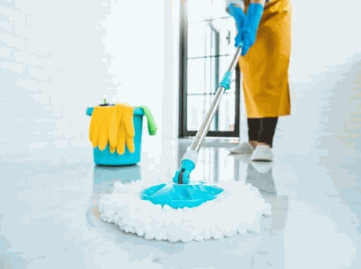
Avoid Wearing Socks Or Bare Feet
To reduce the risk of slipping on floors, it is advisable to avoid walking barefoot or wearing only socks, as these lack proper traction and increase the chances of accidents.
Proper footwear plays a crucial role in maintaining balance and stability, especially on slippery or uneven surfaces. When selecting appropriate shoes, opt for those with rubber soles or slip-resistant features to enhance grip. Consider the activity you will be engaging in - for instance, hiking boots for outdoor adventures or non-slip sneakers for workplace safety. Ensure that the shoes fit properly without being too loose or too tight to prevent discomfort while walking. By prioritizing footwear safety, one can significantly lower the risk of slip and fall incidents.
What Are The Home Remedies For Slippery Floors?
Home remedies offer practical solutions for slippery floors, with options like vinegar solutions, baking soda paste, and other natural cleaning agents providing effective ways to improve traction and safety.
These homemade remedies not only address the issue of slippery floors but also add a touch of eco-friendliness to your cleaning routine. The use of vinegar solutions helps in breaking down grease and grime, leaving the surface clean and less slippery. On the other hand, a simple mixture of baking soda paste can be a gentle abrasive that enhances grip without causing any damage.
Opting for traditional remedies often means avoiding harsh chemicals, making them safer for both your family and the environment. Natural cleaning agents like lemon juice and olive oil can work wonders in restoring shine and preventing slips on different types of floors.
Vinegar Solution
A vinegar solution is a versatile remedy for slippery surfaces, suitable for various types of flooring in household settings. Its acidic properties help break down residue and enhance traction.
When faced with a slippery floor, many may not think of vinegar as a solution, but its effectiveness should not be underestimated. Whether you have tile, hardwood, or laminate flooring, a vinegar solution can work wonders in improving grip and safety. To prepare this home remedy, simply mix equal parts water and vinegar in a spray bottle. Thoroughly clean the slippery area with this solution and allow it to air dry. The acidity in the vinegar not only cleanses the surface but also creates friction, reducing the risk of slip accidents in high-traffic areas. Plus, it's a natural and eco-friendly alternative to harsh chemical cleaners.
To maximize the benefits of using a vinegar solution, it's important to regularly maintain your floors with this method. Implement a weekly routine of cleaning and treating your floors with the vinegar solution to prevent residues from building up and maintaining a safe walking environment for your family and guests. So, next time you encounter a slippery spot at home, don't overlook the power of vinegar as a simple and effective solution for improving floor traction.
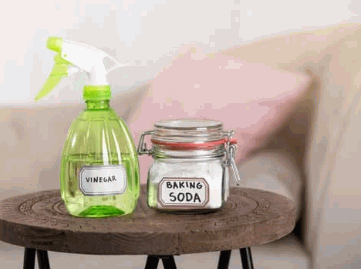
Baking Soda Paste
A baking soda paste is an excellent DIY solution for combating residue and grease on floors, providing a natural and cost-effective approach to improving floor traction and safety.
Using baking soda paste not only helps remove slippery residues from floors but also acts as a powerful natural cleaner, making it an environmentally friendly choice. The abrasive nature of baking soda aids in effectively lifting off tough grease stains that can make floors hazardous. This simple paste is versatile and can be easily made with common household ingredients, making it a practical solution for busy households.
Salt Scrub
A salt scrub can effectively prevent slipperiness on polished floors by providing enhanced traction and durability. Its abrasive nature helps to remove residue and maintain a slip-resistant surface.
Using a salt scrub can significantly improve the overall safety of high-traffic areas in homes or commercial spaces that experience frequent spills or moisture. The unique composition of the salt scrub not only helps to increase grip on slippery surfaces but also adds a layer of protection against potential accidents caused by unexpected slips. By incorporating regular salt scrub treatments into your floor maintenance routine, you can ensure that your polished floors remain safe, slip-resistant, and visually appealing for a longer period of time.
Lemon Juice And Water
A mixture of lemon juice and water serves as a preventive measure against slip and fall accidents, reducing the risk of falls associated with slippery floors and minimizing potential health hazards.
The acidic nature of lemon juice helps break down grease and grime, making the floor less slippery. The natural scent of lemon also provides a refreshing fragrance, unlike harsh chemical cleaners.
When diluted with water, lemon juice is a cost-effective and eco-friendly alternative to commercial cleaners. To prepare a lemon juice mixture, simply combine equal parts of fresh lemon juice and water in a spray bottle and shake well. Then, spray the solution onto the floor and mop the surface thoroughly to ensure even distribution and maximum effectiveness.
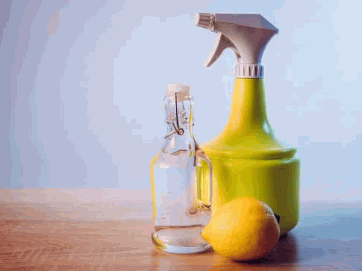
Black Tea
Black tea can be used to treat slippery floors by reducing residue buildup, enhancing the effectiveness of non-slip mats, and minimizing the risk of fall injuries associated with polished surfaces.
When applied to floors, the tannic acid in black tea serves as a natural cleaning agent, breaking down oils and grime that contribute to slipperiness. This not only improves the traction on the surface but also leaves behind a pleasant scent. The antioxidant properties of black tea can help maintain the longevity of non-slip mats by preventing degradation due to prolonged exposure to moisture and dirt. By combining black tea treatments with the use of non-slip mats, individuals can create a comprehensive safety strategy that addresses both the immediate slip hazard and the long-term maintenance of floor surfaces.
Cornstarch And Water
Creating a mixture of cornstarch and water with household items offers a simple solution for addressing slipperiness, reducing the risk within the household environment, and promoting a safer living environment.
When dealing with slippery floors, the cornstarch and water remedy stand out as a cost-effective and eco-friendly option that can be easily prepared at home. To apply this solution effectively, start by mixing equal parts of cornstarch and water to form a smooth paste-like consistency. Once the mixture is ready, gently spread it on the slippery surface, ensuring it covers the entire area thoroughly. Allow it to dry completely and then wipe it away with a damp cloth or mop to reveal a non-slip surface beneath.
The beauty of this approach lies in its simplicity and natural ingredients, making it a preferred choice for many who strive to maintain a hazard-free household environment. Not only does this method reduce the risk of accidents, but it also eliminates the need for harsh chemicals that may pollute the environment. By incorporating this cornstarch solution into your floor maintenance routine, you can enjoy a safer and more sustainable living space for yourself and your loved ones.
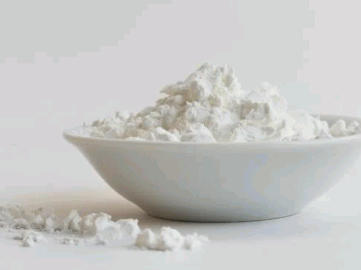
Baby Powder
Utilizing baby powder as a floor treatment option can enhance traction and reduce the risk of slips and falls in areas with high foot traffic, providing a cost-effective solution for improving floor safety.
By applying a thin layer of baby powder on the floor, the particles of the powder create a slightly abrasive surface that helps to increase grip. This is particularly beneficial in places like entryways, kitchens, or bathroom floors where moisture or spills can make the area slippery. The powder absorbs excess moisture, reducing the chances of someone slipping. The pleasant scent of baby powder adds a fresh fragrance to the room, creating a more pleasant environment.
Sand Or Grit
Using sand or grit as additives in cleaning products can improve floor traction, especially in areas with high foot traffic, contributing to enhanced safety and reduced risk of slips and falls.
By incorporating sand or grit into cleaning solutions, you not only achieve cleaner surfaces but also create a textured finish that enhances grip levels. The added traction makes floors less slippery, thereby significantly reducing the likelihood of accidents caused by slipping. This is particularly beneficial in commercial spaces, such as restaurants, malls, or healthcare facilities, where ensuring safety is paramount. The enhanced floor traction provided by sand or grit-based cleaners not only increases safety measures but also instills a sense of security among visitors and staff, fostering a more secure environment.
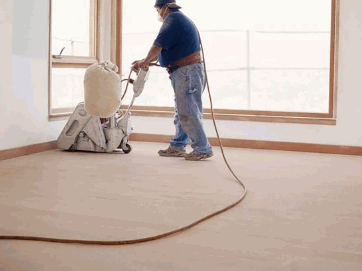
What Are The Natural Cleaning Agents For Slippery Floors?
Natural cleaning agents offer effective solutions for treating slippery floors, with options like white vinegar, lemon juice, baking soda, tea tree oil, and hydrogen peroxide providing safe and eco-friendly alternatives to commercial products.
These natural ingredients not only help to clean and disinfect the floors but also leave behind a fresh and pleasant scent.
White vinegar acts as a powerful degreaser and disinfectant, effectively removing stubborn grime and bacteria. Lemon juice's acidic properties work wonders in breaking down dirt and grease buildup.
Baking soda not only helps to deodorize the floors but also works as a gentle abrasive for tough stains. The tea tree oil serves as a natural antifungal and antibacterial agent, ideal for eliminating germs and molds.
Hydrogen peroxide works as a natural bleaching agent, perfect for brightening and sanitizing floors. Each of these natural ingredients boasts unique benefits and can be combined in various ways to create custom cleaning solutions to suit different floor types and needs.
White Vinegar
White vinegar serves as a versatile household cleaner that enhances traction and reduces slipperiness on various surfaces, making it an ideal natural solution for maintaining non-slip floors.
The acidity in white vinegar helps to break down greasy residues and grime, providing a deep clean that leaves floors not only sparkling but also less slippery. Its antibacterial properties make it an effective sanitizer, removing germs and bacteria that can contribute to slippery surfaces. Mixing white vinegar with water in a spray bottle allows for easy application and quick cleanup, offering a cost-effective and eco-friendly alternative to chemical-laden cleaners.
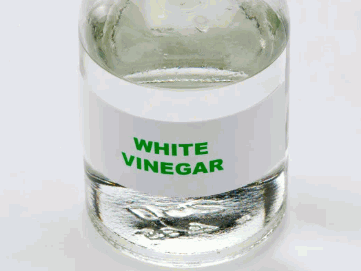
Lemon Juice
Lemon juice acts as a potent cleaning agent that not only prevents slipperiness on floors but also addresses health hazards associated with residue buildup, offering a natural and effective solution for floor maintenance.
Its acidic nature helps break down grime and grease, making it easier to remove tough stains and residues from floors.
The antimicrobial properties of lemon juice contribute to a cleaner and healthier environment by combating germs and bacteria.
By regularly incorporating lemon juice into your cleaning routine, you can significantly reduce the risk of slip-related accidents, ensuring a safer living or working space for everyone.
Baking Soda
Baking soda is a natural cleaning agent known for its abrasive properties that help remove residue, grease, and dirt from floors, making it an eco-friendly option for maintaining slip-resistant surfaces and minimizing health hazards.
Its gentle yet effective composition makes it a versatile solution for tackling various floor surfaces without causing damage or leaving behind harmful chemical residues. Not only does baking soda help eliminate odors and disinfect floors, but it also serves as a cost-effective alternative to commercial cleaners, promoting a toxin-free environment in homes or workplaces. Incorporating baking soda into regular cleaning routines can enhance floor safety by preventing accidents caused by slippery surfaces, ensuring a clean and healthy living space for occupants.
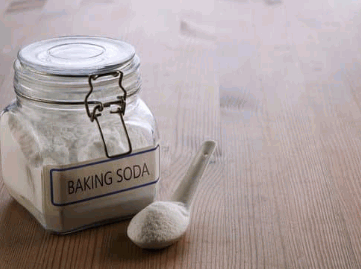
Tea Tree Oil
Tea tree oil is a versatile ingredient in cleaning products that offers antibacterial properties and enhances traction on floors, making it a suitable DIY option for maintaining slip-resistant surfaces in high-foot-traffic areas.
Its natural antibacterial qualities not only help eliminate germs and bacteria without the use of harsh chemicals but also leave a fresh, clean scent behind.
When added to homemade cleaning solutions, tea tree oil can create an effective and eco-friendly way to tackle dirt and grime on various floor surfaces.
The traction-enhancing effects of tea tree oil can especially benefit households with young children, seniors, or pets by reducing the likelihood of slips and falls.
Hydrogen Peroxide
Hydrogen peroxide is a safe and effective cleaning agent that promotes slip-resistant surfaces by eliminating residue and enhancing safety measures, making it a reliable choice for maintaining clean and hazard-free floors.
Its antibacterial properties not only help in disinfecting surfaces but also contribute to creating a healthier environment by reducing the presence of harmful germs and bacteria. Hydrogen peroxide's oxygenating nature aids in breaking down organic stains and soils, making it a versatile solution for tackling various types of spills and grime.
When mixed with water, hydrogen peroxide can be safely used on a range of surfaces, including tile, wood, and laminate, without causing damage or leaving behind harmful chemicals. This eco-friendly alternative to harsh chemical cleaners is gentle yet effective, making it perfect for regular use in homes, offices, and commercial spaces.
